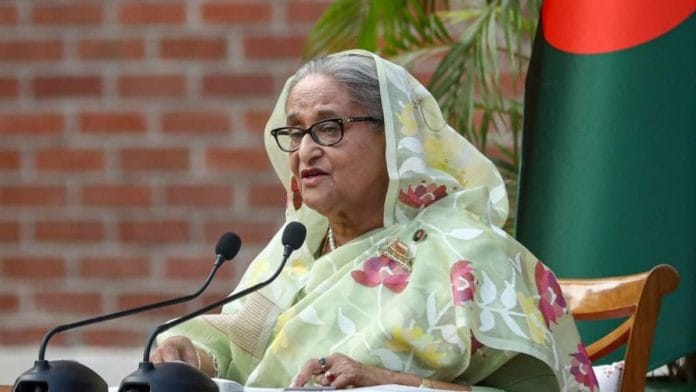New Delhi: The Awami League Party has shared on social media a voice note of former Bangladesh prime minister Sheikh Hasina describing how she fled Bangladesh with her sister in August last year amid an assassination plan against her.
In the audio, Hasina reveals that she, along with her sister Rehana, escaped death by just 20 to 25 minutes. “Surviving the 21 August killings or surviving the big bombing in Kotalipara or surviving 5 August shows that Allah must have willed it, made it happen,” Hasina is heard saying in Bangla.
The 76-year-old ousted PM fled to India last year in August as student-led protests led to the toppling of her government. Hasina referred to a grenade attack from 21 August 2004—which she escaped with injuries—as well as the 5 August 2024 escape as protesters marched towards her official residence.
“We were not supposed to survive this time. The way they planned to kill me, you have later witnessed that…. I am alive because Allah wants me to do unfinished work,” she is heard saying in the 49-second audio.
Since fleeing Bangladesh, Hasina has been in Delhi. On 5 August last year, her bungalow was broken into and ransacked by an angry mob. While speaking on the incident, Hasina breaks down in the audio. ”I am devastated that I have been driven out of my country and driven out of my home. They have burnt everything down,” she says.
What happened in August
The protests that led to the ousting of Hasina were a culmination of the rallies against the Hasina government since mid-July when students initially demanded the removal of a quota system that reserved 30 percent of government jobs for families of those who fought in the 1971 Bangladesh Independence war.
While the Supreme Court addressed the demands by adjusting the quota system, the Hasina government’s violent response to the protests escalated the situation. It led to a broader movement against the Awami League administration.
In the aftermath, the Supreme Court acquitted former Prime Minister Khaleda Zia of all pending corruption charges, allowing her and her son, Tarique Rahman, to participate in future elections. The developments mark a significant shift in Bangladesh’s political landscape, opening the doors for new leadership and potential reforms.
In the last few months, an interim government led by Nobel laureate Muhammad Yunus and backed by the armed forces has been in charge in Bangladesh. During this period, concerns over violence against minorities in Bangladesh have been raised.
(Edited by Madhurita Goswami)
Also Read: Tulip’s resignation in UK is trouble for Hasina. Spotlight on daughter Saima






